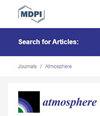应用城市气候模型 PALM-4U 调查柴油交通禁令对斯图加特空气质量的影响
IF 2.5
4区 地球科学
Q3 ENVIRONMENTAL SCIENCES
引用次数: 0
摘要
德国城市斯图加特的空气污染状况非常重要,因为与德国其他城市相比,这里测得的污染物浓度较高。这主要是由于斯图加特所处的地理位置,它位于一个三面环山的盆地中。这导致风速降低,抑制了污染物的扩散。造成斯图加特污染物浓度的主要因素之一是当地的交通。为了改善斯图加特的空气质量,从 2019 年 1 月 1 日起开始实施柴油交通禁令,目前仍在进行中。在这项研究中,应用城市气候模型 PALM-4U 获取了斯图加特联邦公路 B14 和 B27 沿线的污染物分布情况,以评估柴油交通禁令对空气质量的影响。模拟在城市的两个区域进行,即市中心和卡尔坦特山谷,域的大小分别为 3.2 km × 2 km 和 3.2 km × 1.6 km,每个域的网格大小为 10 m。在一个典型的夏日,研究了交通排放对斯图加特空气质量的影响。结果显示,联邦公路 B14 和 B27 附近的空气污染物浓度最高(例如,二氧化氮浓度峰值约为 200 µg/m3)。此外,在柴油交通禁令实施后,研究区域的空气污染物浓度明显降低了约四倍。本文章由计算机程序翻译,如有差异,请以英文原文为准。
Application of the Urban Climate Model PALM-4U to Investigate the Effects of the Diesel Traffic Ban on Air Quality in Stuttgart
The air pollution situation in the German city of Stuttgart is very important, as high pollutant concentrations are measured here compared to other German cities. This is mainly due to Stuttgart’s geographical location as it is in a basin covered by hills on three sides. This leads to reduced wind speeds that inhibit pollutant dispersion. One of the main contributors to the pollutant concentrations in Stuttgart is local traffic. To improve the air quality in Stuttgart, a diesel traffic ban was introduced on 1 January 2019, and is ongoing. In this study, the urban climate model PALM-4U was applied to obtain the pollutant distribution along the federal highways B14 and B27 of Stuttgart to evaluate the impact of the diesel traffic ban on air quality. The simulations were carried out in two areas of the city, namely the city center and Kaltental Valley, with domain sizes of 3.2 km × 2 km and 3.2 km × 1.6 km, respectively, and with a grid size of 10 m for each domain. The influence of traffic emissions on the air quality of Stuttgart was studied for a typical summer day. The results showed that air pollutant concentrations were highest near federal highways B14 and B27 (e.g., NO2 concentration peaks of around 200 µg/m3). Also, a significant reduction of around four times in air pollutant concentrations was observed in the study area after the diesel traffic ban was introduced.
求助全文
通过发布文献求助,成功后即可免费获取论文全文。
去求助
来源期刊

Atmosphere
METEOROLOGY & ATMOSPHERIC SCIENCES-
CiteScore
4.60
自引率
13.80%
发文量
1769
审稿时长
1 months
期刊介绍:
Atmosphere (ISSN 2073-4433) is an international and cross-disciplinary scholarly journal of scientific studies related to the atmosphere. It publishes reviews, regular research papers, communications and short notes, and there is no restriction on the length of the papers. Our aim is to encourage scientists to publish their experimental and theoretical research in as much detail as possible. Full experimental and/or methodical details must be provided for research articles.
 求助内容:
求助内容: 应助结果提醒方式:
应助结果提醒方式:


